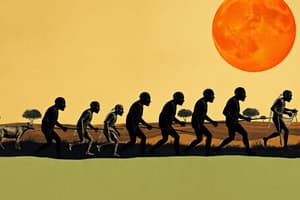Podcast
Questions and Answers
What significant change occurred in human fossils from 30,000 years ago to today?
What significant change occurred in human fossils from 30,000 years ago to today?
- They developed larger skeletal structures.
- They exhibited less genetic similarity.
- They shared a modern anatomical form. (correct)
- They showed increased brain size variability.
Which theory suggests that modern humans evolved simultaneously in different regions?
Which theory suggests that modern humans evolved simultaneously in different regions?
- Parallel Evolution Theory
- Out of Africa Theory
- Multiregional Continuity Theory (correct)
- Single Origin Theory
What does the Out of Africa theory claim about the evolution of modern humans?
What does the Out of Africa theory claim about the evolution of modern humans?
- They replaced previous populations after migrating from Africa. (correct)
- They interbred extensively with Neanderthals.
- They emerged from multiple ancestral groups.
- They evolved independently in Europe and Asia.
According to the multiregional continuity theory, what is a critical aspect of the evolution of modern humans?
According to the multiregional continuity theory, what is a critical aspect of the evolution of modern humans?
What type of evidence has been examined to determine which theory about human origins is correct?
What type of evidence has been examined to determine which theory about human origins is correct?
How did Neanderthals and Homo sapiens differ according to the anatomical evidence?
How did Neanderthals and Homo sapiens differ according to the anatomical evidence?
What anatomical feature distinguishes early Homo sapiens from Neanderthals?
What anatomical feature distinguishes early Homo sapiens from Neanderthals?
What major cultural change occurred around 40,000 to 50,000 years ago?
What major cultural change occurred around 40,000 to 50,000 years ago?
What does the genetic evidence suggest about interbreeding between Neanderthals and modern humans?
What does the genetic evidence suggest about interbreeding between Neanderthals and modern humans?
Which hypothesis about modern human origins is primarily supported by genetic evidence?
Which hypothesis about modern human origins is primarily supported by genetic evidence?
Which of the following factors is NOT suggested as a reason for the extinction of Neanderthals?
Which of the following factors is NOT suggested as a reason for the extinction of Neanderthals?
What is one of the key differences in genetic variation between modern human populations?
What is one of the key differences in genetic variation between modern human populations?
Which assertion about Neanderthals' tools and artifacts is true based on the provided evidence?
Which assertion about Neanderthals' tools and artifacts is true based on the provided evidence?
What does research involving rats indicate about learning predispositions?
What does research involving rats indicate about learning predispositions?
Which theory suggests an evolutionary advantage in fear conditioning for certain stimuli?
Which theory suggests an evolutionary advantage in fear conditioning for certain stimuli?
What was a major outcome of the cognitive revolution in psychology?
What was a major outcome of the cognitive revolution in psychology?
What parallels are drawn between the cognitive mechanisms and computer programs?
What parallels are drawn between the cognitive mechanisms and computer programs?
How is the information-processing model significant in understanding behavior?
How is the information-processing model significant in understanding behavior?
What assumption did cognitive psychologists inherit from behaviorism?
What assumption did cognitive psychologists inherit from behaviorism?
What role do specialized mechanisms play in human sensory processing?
What role do specialized mechanisms play in human sensory processing?
In the context of fear conditioning, which scenario is considered more difficult to learn?
In the context of fear conditioning, which scenario is considered more difficult to learn?
What do behaviorists believe about the nature of human beings?
What do behaviorists believe about the nature of human beings?
What was one of the findings that questioned Margaret Mead's depiction of Samoan culture?
What was one of the findings that questioned Margaret Mead's depiction of Samoan culture?
What did Harry Harlow's experiment with monkeys demonstrate?
What did Harry Harlow's experiment with monkeys demonstrate?
What is a universal human behavior identified through cultural studies?
What is a universal human behavior identified through cultural studies?
What does the Garcia Effect demonstrate regarding learning?
What does the Garcia Effect demonstrate regarding learning?
Which statement about cultural myths is presented in the content?
Which statement about cultural myths is presented in the content?
Which aspect of human behavior do behaviorists emphasize the least?
Which aspect of human behavior do behaviorists emphasize the least?
What did the findings of Derek Freeman contribute to understanding human behavior?
What did the findings of Derek Freeman contribute to understanding human behavior?
What role did Margaret Mead play in cultural anthropology?
What role did Margaret Mead play in cultural anthropology?
Which conclusion can be drawn regarding the influence of Western culture on human behavior?
Which conclusion can be drawn regarding the influence of Western culture on human behavior?
What was Freud's initial proposal regarding the driving force of human behavior?
What was Freud's initial proposal regarding the driving force of human behavior?
How did Freud categorize his two fundamental classes of instincts?
How did Freud categorize his two fundamental classes of instincts?
According to William James, how can instincts be expressed?
According to William James, how can instincts be expressed?
What was William James's view on the number of human instincts?
What was William James's view on the number of human instincts?
What did behaviorists like John B. Watson emphasize regarding learning?
What did behaviorists like John B. Watson emphasize regarding learning?
How did B.F. Skinner differ from instinctivists like William James?
How did B.F. Skinner differ from instinctivists like William James?
What aspect of instincts did skeptics in the 1920s propose?
What aspect of instincts did skeptics in the 1920s propose?
What two major classes of instincts did Freud later combine into 'life instincts'?
What two major classes of instincts did Freud later combine into 'life instincts'?
What defining feature marked Freud’s concept of 'mature sexuality'?
What defining feature marked Freud’s concept of 'mature sexuality'?
Flashcards are hidden until you start studying
Study Notes
Out of Africa Theory and Multiregional Continuity Theory
- Two theories explain the origin of modern humans: Out of Africa (OOA) and Multiregional Continuity (MRC).
- OOA states that modern humans evolved in Africa and migrated to other regions, replacing existing populations (like Neanderthals).
- MRC proposes that different groups of humans in various parts of the world evolved in parallel, with gene flow preventing separate species formation.
- Anatomical evidence supports OOA: Significant differences between Neanderthals and early Homo sapiens suggest limited interbreeding.
- Archeological evidence also supports OOA: "Creative explosion" of tool diversity, elaborate burials, and art development occurred primarily in Homo sapiens.
- Recent genetic evidence strengthens OOA: Neanderthal DNA is distinct from modern humans, with limited interbreeding. More genetic variation among African populations supports their origins as the starting point of human migration.
- While the OOA is generally accepted, some scientists suggest a hybrid incorporating parts of both theories, acknowledging potential interbreeding.
- Neanderthal DNA found in modern humans is estimated to be around 2 percent.
Freud's Psychoanalytic Theory
- Sigmund Freud's theory of psychoanalysis emphasized sexuality as a driving force of human behavior.
- Initial theory included life-preservative instincts (survival needs) and sexual instincts (culminating in reproduction).
- Freud later combined these into "life instincts" and added a "death instinct".
William James's Psychology of Instincts
- William James's theory of instincts differed from Freud's, emphasizing a broader range of innate behaviors.
- Instincts were defined as automatic actions with no prior learning or conscious intent.
- James argued that humans have numerous instincts beyond those recognized by other psychologists.
- His list included basic reflexes, social behavior, curiosity, and parenting, with specific variations within each instinct.
Rise of Behaviorism
- Behaviorists, like James B. Watson and B.F. Skinner, rejected the importance of instincts and emphasized learning.
- Classical conditioning (Watson) proposed that neutral stimuli can become associated with other stimuli, evoking specific responses.
- Operant conditioning (Skinner) held that reinforcement or punishment following behavior determines its future occurrence.
- Behaviorists believed that humans are general learning machines with few innate qualities, and all behaviors can be shaped by environment.
Influence of Cultural Variability
- Early cultural anthropologists, like Margaret Mead, highlighted the diversity of customs and behaviors across cultures.
- Research on "cultural paradises" emphasized the influence of culture on shaping human behavior.
- Subsequent research revealed flaws in these early studies, finding many universal human behaviors despite cultural differences.
- Male sexual jealousy, common emotional expressions (like fear and joy), and love are examples of human universals across cultures.
Challenges to Behaviorism
- Research by Harry Harlow on monkeys raised in isolation with artificial mothers challenged the behaviorist theory.
- Monkeys preferred the terry cloth mother for comfort, despite the wire mother providing food.
- This suggested that innate needs (like comfort) can override learned associations based purely on reinforcement.
- These findings further challenged the idea that humans are blank slates solely shaped by environment.
Radical Behaviorism
- Rats given radiation hours after eating a specific food learned to avoid it in one trial
- Rats did not learn to avoid stimuli like buzzers or light flashes paired with nausea
- Rats are predisposed to learn certain things, like avoiding food that makes them sick
- Some fears, like snakes, are easy to condition, while others, like cars, are difficult
- Behaviorism was violated, suggesting internal factors influence learning
Cognitive Revolution
- Cognitive revolution looked inside the head, not just at external factors
- Computer science inspired information processing framework
- Information processing framework describes how mechanisms take input, transform it, and produce output
- The human brain is composed of programs that process information
- Cognitive level of description is helpful even without understanding all brain mechanisms
- Humans are not domain-general information processors, they are specialized for specific tasks
Evolutionary Psychology
- Humans come equipped to process specific information
- Evolutionary psychology describes how the mind is designed to solve problems of survival and reproduction
- Evolutionary psychology is a synthesis of modern psychology and modern evolutionary biology
Natural Selection
- Evolution involves changes in organisms over time
- Natural selection explains how change occurs: variation, inheritance, and differential reproduction
- Natural selection favors inherited variations that lead to higher reproductive success
Sexual Selection
- Sexual selection explains the evolution of traits related to mating success
- Intrasexual competition: males compete for access to females
- Intersexual selection: females choose mates based on preferred traits
Modern Synthesis
- Modern synthesis combined Darwin's theory of natural selection with Mendel's theory of particulate inheritance
- Genes, the fundamental unit of inheritance, are passed intact from parent to child
Ethology
- Ethology studies animal behavior within an evolutionary context
- Focuses on the origins and functions of behavior
Inclusive Fitness
- Inclusive fitness includes the effects of an individual's actions on the reproductive success of genetic relatives
- Promotes a "gene's eye" view of selection
Adaptation
- Adaptations are traits that are efficient, reliable, and precise
- They are selected for due to their survival or reproductive benefits
Misconceptions about Evolutionary Theory
- Evolutionary theory does not imply that human behavior is genetically determined
- Evolutionary theory does not imply that human behavior is unchangeable
- Evolutionary theory does not imply optimal design
Human Evolution
- Humans are mammals that evolved over 200 million years
- Our primate lineage began 85 million years ago
- Bipedalism evolved 4.4 million years ago
- Tool use began 2.5 million years ago
- Humans are complex organisms with a long evolutionary history
Psychology and Evolution
- Evolutionary ideas influenced early psychology
- Radical behaviorism emphasized general principles of learning over evolutionary explanations
- Cognitive revolution brought back internal factors and information processing
- Evolutionary psychology combines modern psychology and evolutionary biology to understand human behavior
Studying That Suits You
Use AI to generate personalized quizzes and flashcards to suit your learning preferences.




